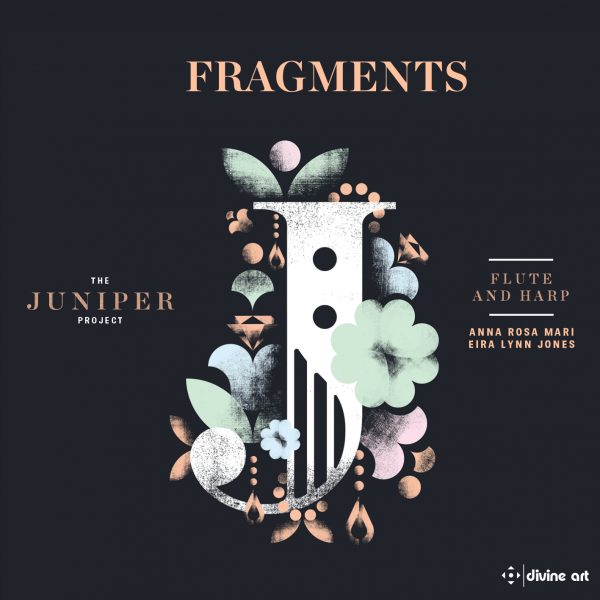Fanfare
Flute and harp is a tried and tested combination, a combination that offers up a garden of delights. Flutist Anna Rosa Mari and harpist Eira Lynn Jones, collectively The Juniper Project, provide a fragrant mix of the well-known and the more obscure.
After studying in Besançon, Strasbourg, and Paris, Bernard Andres (b. 1941) was principal harpist of the Radio France Philharmonic. His Algues (Seaweed) is a seven-movement suite from 1987 that finds the flute soaring above a multitude of harp sonorities, including “sons xylophoniques”: holding the string at the base of the harp’s soundboard to produce a xylophone-like muted sound. Mari caresses the line beautifully. In contrast come the vivid rhythms of Ibert’s Entr’acte, a piece that was originally part of incidental music to Calderon’s El medico de su honra but soon established its own independent life. It swirls enigmatically, the composer’s harmonies far from predictable. Ibert is one of those composers still to receive his full due, whether in his piano music (there is a serviceable Naxos release that can help in that regard by Hae-won Chang), the operas (Persee et Andromede, recorded on Avie, points to a notable voice here), or the larger-scale orchestral works.
It’s nice to have a harp interlude in the form of “that” flaxen-haired girl, played here with notable insight as well as intimacy; it is balanced by a sinuously performed flute solo, the famous Syrinx (another piece originally used as incidental music, this time under the title “Flute de Pan” for Mourey’s play Psyche). In between are Lutoslawski’s Three Fragments, moving into another, more harmonically grounded, world. Dating from 1953 and again written for theater (radio plays this time: the first for Theocritus’ play The Spell, the second and third for Odysseus in Ithaca by Parandowski), Three Fragments is contemporaneous with Lutoslawski’s Concerto for Orchestra, and consists of three tiny jewels.
The name of Jules Mouquet (1867-1946) is new to me. He was a professor of harmony at the Paris Conservatoire, and his Danse greque is part of a fascination the French composers had with ancient Greece. It is a gently lively piece, and The Juniper Project conveys this teasing sense of joy impeccably, just as they do the lilting rhythms of the Vaughan Williams, this latter arranged by the harpist Eira Lynn Jones alongside David Sumbler. A touch of vinegar enters the harmonic palette in Dutch composer Henrik Andriessen’s Intermezzo, a work that delights in playing with listeners’ expectations. Unsurprisingly perhaps, the Rutter “Chanson” is more conservative, heard here in an arrangement by the present harpist (the original is for flute, harpsichord, and string orchestra). Those warm harmonies one associates with Rutter’s music are here in abundance.
It’s lovely to see some Hovhaness here, in this instance the first, second, and sixth movements of his The Garden of Adonis of 1971. The idea behind the suite comes from Edmund Spencer’s play The Faerie Queen and a garden of rebirth in which souls reincarnate as flowers. The three movements are nicely diverse, the orientalist harmonies of the evocative harp in the finale being particularly appealing in their sophistication. Finally, Derby-born composer John Marson’s jazzy “Can’t stop to talk,” from his Suite for Flute and Harp, is the perfect light-hearted encore.
The performance standard here is remarkable, the recording perfectly judged. Thank goodness neither of the instruments is forced in front of the listener’s face in terms of recording perspective, either. Beautifully performed, this is a most sophisticated program.
@divineartrecordingsgroup
A First Inversion Company
Registered Office:
176-178 Pontefract Road, Cudworth, Barnsley S72 8BE
+44 1226 596703
Fort Worth, TX 76110
+1.682.233.4978












